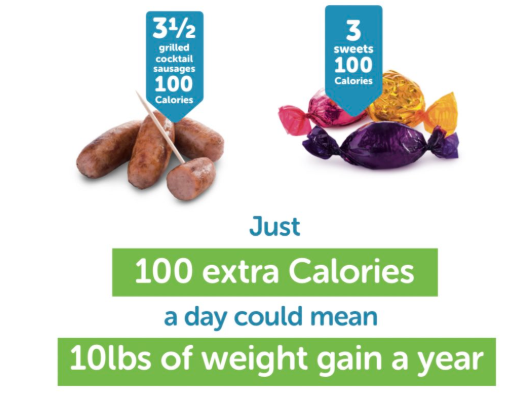This website uses cookies so that we can provide you with the best user experience possible. Cookie information is stored in your browser and performs functions such as recognising you when you return to our website and helping our team to understand which sections of the website you find most interesting and useful.

The government has been criticised over new “eat a little less” posters which state: “Just 100 extra calories a day could mean 10lbs of weight gain a year.”
The poster, commissioned by the Public Health Agency (PHA) in Northern Ireland, shows what 100 calories looks like in four different snacks.
It includes pictures of three and a half cocktail sausages, three sweets, one digestive biscuit or one medium latte drink.
Vanessa, 30, from Belfast posted a photograph of the poster on her social media, with the caption: “I just saw this poster at a bus stop talking about how 3 wee sausages or 1 f**king digestive biscuit will make you gain 10lbs I’m actually gobsmacked?
“What does this achieve other than make those with eating disorders and compulsive calorie counters feel worse?”
Others commented saying they had also seen the posters: “Literally saw this today, it’s the same with the whole ‘you can lose 10 million stone if you stop taking sugar in your tea’ like it’s hardly going to kill you?”
Another said: “Seeing this could f**k a lot of people in recovery up as well! Like if I was caught off guard by this in public I doubt I’d handle it well tbh.”
“Near-universal criticism from ED [eating disorder] specialists to include calorie content on publicly-distributed health materials, but good job Department of Health,” said another.
Another said: “The ‘eat a little less’ turns me too like why not make it about healthy choices if u r that concerned with people’s weight instead of telling them to restrict their intake I’m fuming [sic].”
Tom Quinn, director of external affairs at Beat, the UK’s leading eating disorder charity, told The Independent: “It is important that messages aimed at reducing obesity consider the impact they may have on individuals at risk of developing an eating disorder.
“Focusing solely on calorie counting, rather than healthy and balanced eating, is unhelpful and could be harmful for those already unwell or vulnerable.
“Public health professionals must move away from obesity-shaming to emphasising healthy behavioural changes and instilling confidence into people.”
A spokesperson for the PHA told The Independent: “Obesity is a major public health challenge facing Northern Ireland. Currently more than three in five people are classed as being overweight or obese, and it is now the norm rather than the exception to carry excess weight.
“’Extras’ is part of the Choose to Live Better campaign which is targeted at members of the general population who are overweight or obese. Previous phases of the public information campaign focused on waist measurement, physical activity as well as nutrition.
“’Extras’ aims to encourage people to think about the unnecessary ‘extras’ eg snacks, nibbles, second helpings, etc. they eat and show how easy it is to gain weight if they consume more food than they require to maintain a healthy weight .
“A number of concepts were tested with the public and ‘extras’ tested positively because it focused on small changes. The message ‘eating an extra 100 calories each day means gaining an unwanted 4.5kg (10lbs) each year’ and showing visually what 100 calories looks like was seen as a positive,” they added.
The PHA confirmed that this is a re-run of a previous campaign, and will be shown on TV, radio and outdoor advertising.
The PHA was established in 2009 under the health and social care body in Northern Ireland, to oversee a major reform of health infrastructure in the region.
On their website they say their purpose is to: “Protect and improve the health and social wellbeing of our population and reduce health inequalities through strong partnerships with individuals, communities and other key public, private and voluntary organisations.”
Similar campaigns run by Public Health England have previously been criticised: in January 2018 a campaign was criticised after encouraging parents to only give children snacks with fewer than than 100 calories.
If you have been affected by any of the issues mentioned in this article, you can contact the following organisations for support: the BEAT helpline on 0808 801 0677 or Mind on 0300 123 3393.



 Africana55 Radio
Africana55 Radio 

